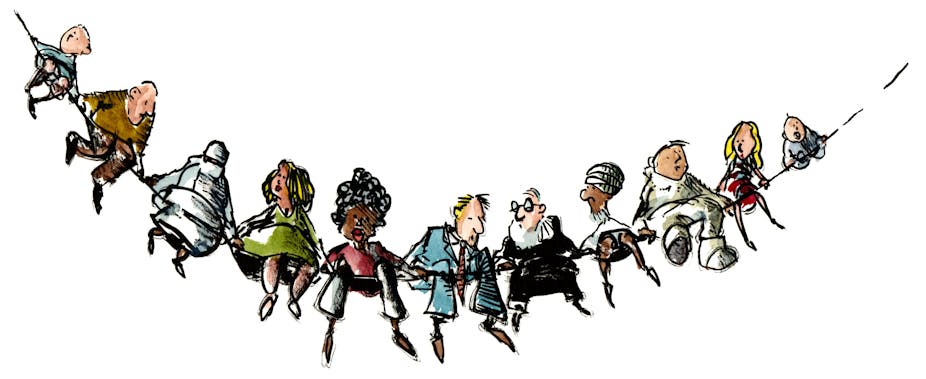“What do you do?” It’s a question that always makes my heart sink, which aspect of what I do should I highlight in the answer to this minefield of a question.
The answer must be brief because the attention span of the interrogator will last only as long as politeness dictates. But it must also be carefully crafted because it sets the tone for subsequent conversation. Although I’ve been asked many times I’m yet to find a universally suitable answer to this question.
I’m the director of the Australian Research Centre in Sex, Health and Society (ARCSHS, pronounced “arches” or “archers” – it’s the best we can do with only one vowel!) at La Trobe University. But I would never say that to a taxi driver at the start of a long ride, or anyone else I might be stuck with for a period of time.
Often I mumble about “working in women’s health” and study my phone or if I’m feeling chatty I brightly say I’m “a researcher at La Trobe” and start talking about the weather. It’s not that I don’t want to talk about my work, or the important and unique work done at ARCSHS.
I’ve just learnt to anticipate the raised eyebrow, salacious lip-licking and inappropriate comment that indicates someone’s stopped listening after they heard the word “sex” and now thinks I’m a sex expert.
I am but not of the salacious kind, and this column is about the intersection of sex, health and society. It’s not about “how to be really good at sex”. In fact, it’s not going to be very titillating at all. You’ll have to go elsewhere if that’s your thing.
I’m interested in how issues relating to sex, gender and sexuality impact physical and mental wellbeing and how these issues shape, and are shaped by, the types of societies we build and value.
Sex is used to sell everything from happiness and social inclusion to soft drink and power tools, but for many people it’s a cause of agonising shame and embarrassment, or even discrimination, bullying or violence.
While the positive messages we often receive from the mass media and scientific research promote the need for healthy sexual lives, the negative impact of our collective discomfort with sex, sexuality, sexual identity, gender and related concepts is manifested in many complex problems.
Understanding sex and its relationship with health and society, and how to influence and change things for the better, involves asking some big questions, such as:
• How do we promote positive sexuality across the life span?
• What are the implications of new developments in the scientific understanding of the genetic, hormonal and neuroscience underpinnings of sex, gender and sexuality?
• How does our view of social norms and our cultural and religious beliefs about sex impact on our health and well-being?
• How can we combat sexuality and gender-based abuse, and the mental and emotional trauma that results?
• How can we overcome the widespread reluctance to implement evidence-based comprehensive sex education in schools which results in the damaging de facto sex education of young people by peers, internet pornography and popular media?
• How can we best deal with the mental health consequences of misogynist and homophobic bullying and violence at school and beyond?
• How can we ease the awkwardness many people feel in the doctor’s surgery resulting from stigma and misunderstanding, leading to suboptimal clinical care for those unwilling to disclose their sexual activities, not just in relation to sexual health, but also in diseases such as cervical and prostate cancer?
• How can we prevent and minimise the growing impact of viral hepatitis (which can be sexually transmitted) on affected communities, health professionals and the health system?
• How can we reduce the rate of unintended pregnancy, the spread of sexually transmissible diseases including HIV, and the physical and mental health consequences?
• How can we conduct research on these sensitive issues that makes a real difference to the health and well-being of everyone, but particularly stigmatised and marginalised communities?
• How can we create a better world that values the important and positive role of sexuality in society?
This column will wrestle with these complex issues and difficult questions. It will explore ways we can make a positive impact on people’s lives. It won’t be titillating, but I’m sure it will be interesting.
And if you can summarise all this into a 20-second response I can use to the question “what do you do?”, please let me know – I will be eternally grateful.

